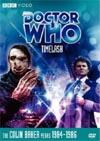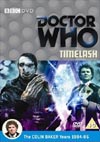DVD Extras include:
One of the early sequences containing plot-critical action is a prime example. Director Pennant Roberts attempts to record the whole thing "live" with a multi-camera set-up, forcing the actors to use unbelievably bad timing to hit their marks. Single camera work is what is called for instead. It's well within the technical capabilities for this period. Additionally, so much of the plot hinges on what happens here, there's little chance that it's a scene you could cut for time and/or lameness. So many other scenes could have simply done with extra takes, to nail the acting. A great disappointment.
Bent Out of ShapeBut as always, the script is where it all starts, and Timelash is replete with dialogue that doesn't really inspire great acting in the first place. Both Glen McCoy's scripts and Eric Saward's rewrites feature heavy doses of the type of irritating nagging that leads to the usual passive-aggressive violence for relief. Another mistake is in the realizing of "Herbert" as a kind of over-eager fan-boy, which never leads to a single scene that makes his character either good or wanted. Add to that the fact that they keep his main reason for being in the story a secret until the last scene, and one guarantees that he is not going to go over well with the audience in the meantime. The best the writers can hope for is last-minute forgiveness.And of course add to these problems all the usual story structure miscalculations needlessly adopted as status quo during this season of experimenting with 45-minute episode lengths. I will continue to automatically refer to the 25-minute international versions of this season's episodes, especially since it really highlights those miscalculations in the writing. The half-hour part one sees the guest cast on planet Karfel establish themselves and their conflicts fairly well - but all without any involvement from the Doctor and Peri. Why can't Saward see the advantage of bringing his main character to the scene of the story on time when commissioning storylines? It's baffling. The international Part One ends without anything remotely approaching a great cliffhanger. The international part two seems to be grasping at straws to find something to give the Doctor to do. For a full dissection, come back and read the in-depth analysis version of this review after you've seen the story. The timelash itself seems to be trying to position itself as the big unique thing to be feared in the adventure, despite the huge host of reasons why it really can't work, up to and including the way it functions as a story-device. But enough said here.
It finally gets good....All things considered, the main conflict finally gels early in part three and works better here than elsewhere. In fact, the combination of battles, resourcefulness, and tactics on display here may well be the best plotted action sequences in the entire season, and with plenty of eye-candy effects, they do turn out fairly well. The acting still deserves to go up another notch, but isn't too bad here. International viewers were even treated to increasing tensions leading up to a triple-threat cliffhanger, coming about by accident! I must say, part three was slightly impressive.We then actually get a very interesting ending in Part Four that satisfies on many levels. Trouble is, it comes only 6 minutes into the episode, and there are 17 minutes left to go......! It seems this got messed up from the story-planning phase, long before the post-production rewrites and re-shoots began. The bottom line is that "Timelash" has no real clue what to do with the extra time on its hands, and proceeds to put some of the most inane and cringe-worthy scenes ever in Doctor Who onto our screens. You could just snip about 85% of it out and no one would ever know anything was missing. Timelash should have ended much, MUCH sooner, while it was still briefly on top of its game.
Salvaging Some CharismaFor all the numerous ideas experimented with in this adventure, the key quality to focus on that will determine success or failure is.... charisma. We need it in the dialogue, as Robert Holmes was good at doing. We need to go back for additional takes if it's missing from acting or action. We need it to permeate design of sets, costume, make-up, the works. Sadly, it seems the video effects might be the only department to have kept up to standard here.We do get to see a few good performances here. Colin Baker is quite good on the whole in this story. In fact, even in scenes where other actors appear lost opposite him, Colin's presence seems to be salvaging the charisma somewhat and bringing the scene back up to a half decent level. A truly valiant effort. Other kudos go to the actors playing Maylin Renis, Aram, Sezon, and Katz, who manage some really sympathetic performances. I was especially pleased to see Denis Carey produce a flawless and compelling performance in one of the most undervalued roles of the story. Carey combines really well with Robert Ashby's excellent vocal work to build up a superb sense of mystery and anticipation surrounding the Borad's history and true nature. Although make-up and costume for the villain isn't particularly inspiring, he has been quite effective in his lair through his various half-hidden, nicely voiced presences. Well done. A lot of the other actors with major roles are doing their best, but Pennant Roberts' directing is really letting them down this time. I really wasn't impressed by Paul Darrow's Tekker when I first saw the story, but then after having seen how well he did as a leading regular on Blake's 7, I find it easier to be sympathetic with what he is attempting here. I think he gets much better as the story progresses. Indeed, it's probably not until his last scene that his character makes sense on paper, and this is, I think, where Darrow is at his best. As another nod to Blake's 7, that show's sound effects designer from the BBC Radiophonic Workshop, Liz Parker, actually gets to compose the incidental music here. Although it may not be the greatest of the Workshop's electronic scores, it serves the story well. Perhaps it does suffer slightly from the intellectual urge to find originality by breaking all the rules and playing notes seemingly at random, which often seemed to define mainstream experimental electronic music early on. But, we will find themes, motifs, and defining instrument sounds here, and there is much artistic merit in the score. The most defining, memorable portions for me are the disjointed bits augmenting the movements of the android. Nice.
This story has become available on DVD and VHS video. Click on the Amazon symbol for the location nearest you for pricing and availability:
Comments on this article are welcome. You may contact the author from this page:
|








